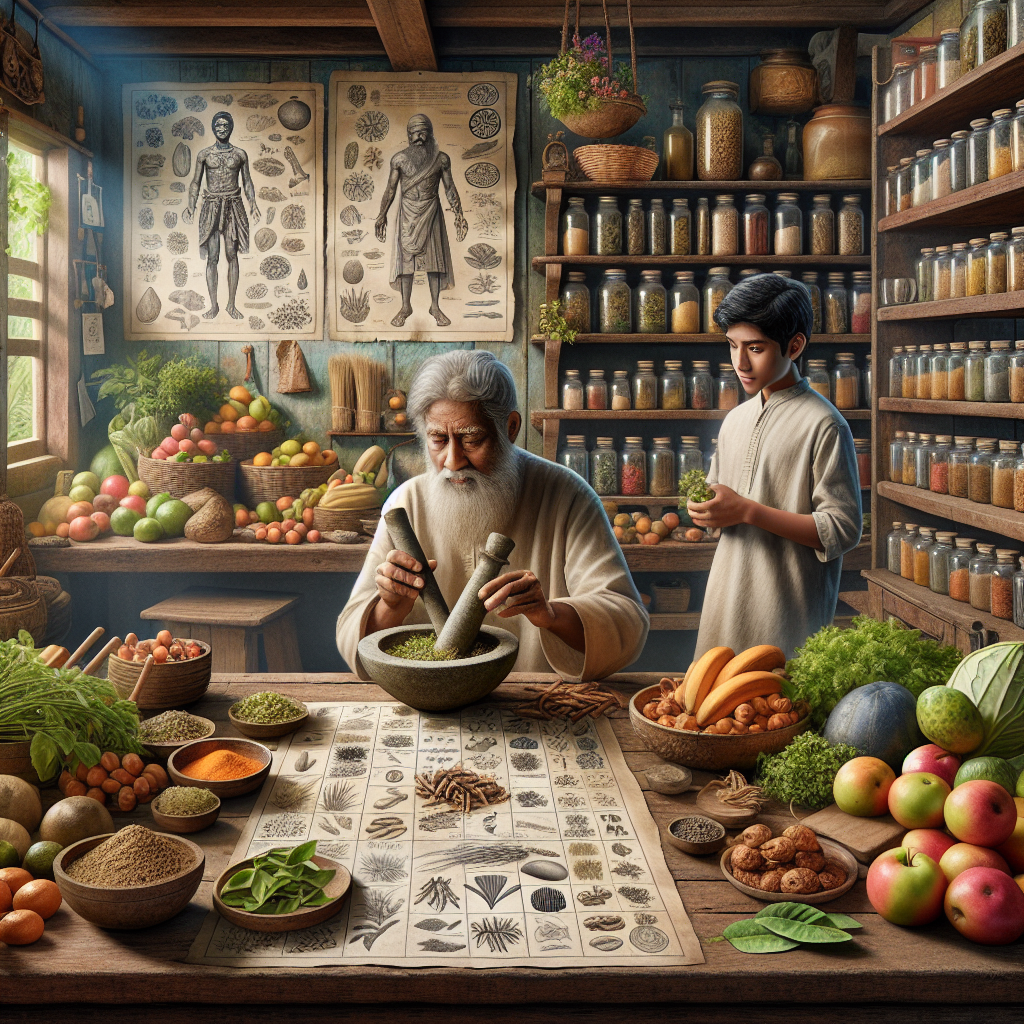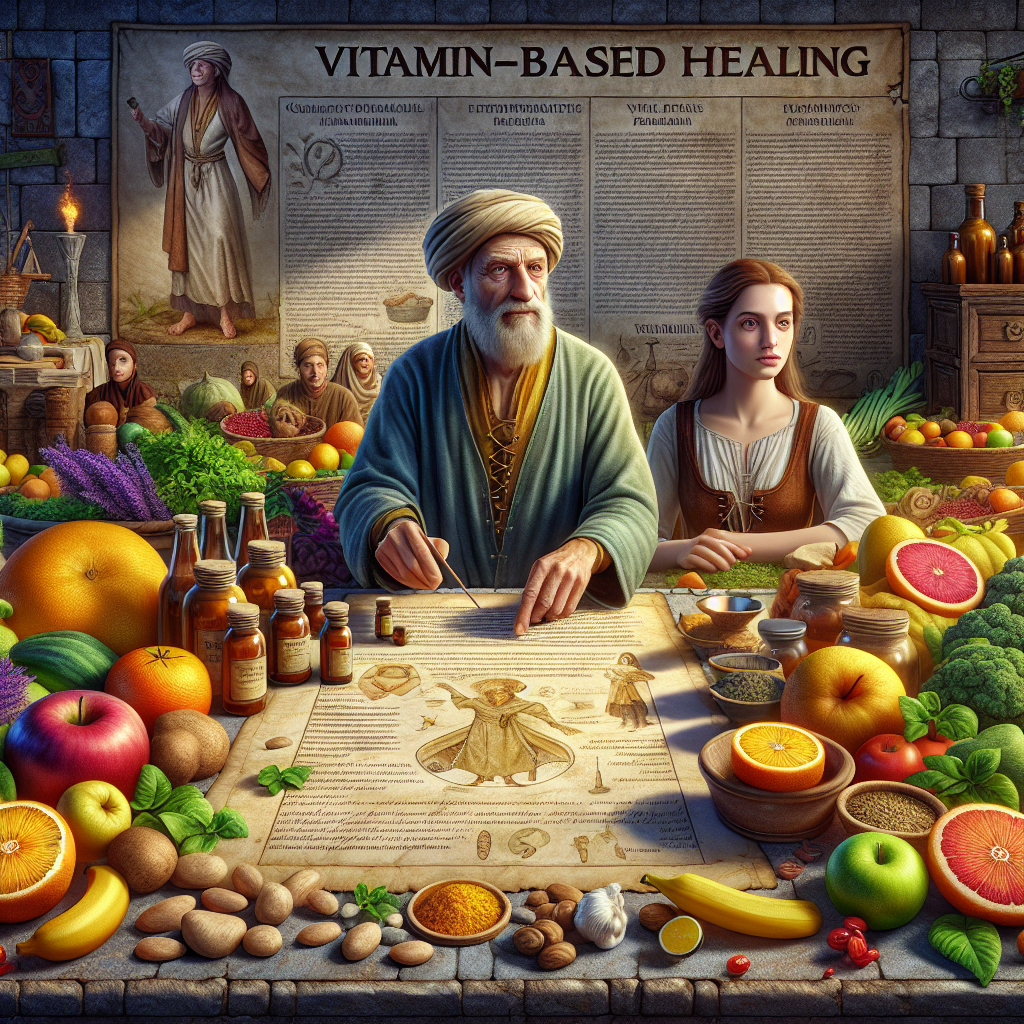Ancient Practices in Vitamin-Based Healing

Discover the secrets of ancient practices in vitamin-based healing! Uncover the wisdom of our ancestors and learn how to incorporate these time-tested methods into your modern lifestyle for optimal health. Visit My Vibrant Vitality now to start your journey towards a healthier you.
Exploring the Role of Vitamins in Ancient Healing Techniques
The ancient world was a treasure trove of knowledge and wisdom, particularly in the realm of health and wellness. Long before the advent of modern medicine, our ancestors had a profound understanding of the human body and its intricate workings. One of the most fascinating aspects of this ancient wisdom is the role of vitamins in healing. This article will delve into the intriguing world of ancient practices in vitamin-based healing, shedding light on how our forebears harnessed the power of these essential nutrients to promote health and wellbeing.
Vitamins, as we understand them today, are organic compounds that our bodies need in small amounts to function properly. They play a crucial role in various bodily functions, including growth, digestion, and nerve function. While the concept of vitamins as we know it did not exist in ancient times, our ancestors had an intuitive understanding of the importance of certain foods and substances in maintaining health and treating illness.
In ancient Egypt, for instance, liver was often prescribed as a remedy for night blindness. Today, we know that night blindness is caused by a deficiency of vitamin A, which is abundant in liver. Similarly, in ancient Greece, citrus fruits were used to treat and prevent scurvy, a disease we now know to be caused by a deficiency of vitamin C.
The ancient Indian system of medicine, Ayurveda, also recognized the importance of vitamins, albeit in a different form. Ayurvedic texts dating back thousands of years recommend a balanced diet rich in a variety of foods to ensure the body receives all the necessary nutrients. These texts also describe the use of certain herbs and spices, such as turmeric and amla, which are now known to be rich in vitamins C and E, respectively.
In China, the ancient practice of Traditional Chinese Medicine (TCM) also emphasized the importance of dietary therapy in maintaining health and treating disease. TCM practitioners prescribed foods rich in certain nutrients to treat specific ailments. For example, goji berries, which are high in vitamins A and C, were used to strengthen the immune system and improve vision.
The ancient Mayans, too, understood the healing power of vitamins. They consumed a diet rich in fruits, vegetables, and grains, which provided them with a wide range of essential vitamins. They also used certain plants, such as the guava tree, for their medicinal properties. Guava is rich in vitamin C and was used by the Mayans to treat a variety of ailments, including digestive disorders and wounds.
In conclusion, while the concept of vitamins as we understand it today did not exist in ancient times, our ancestors had a deep understanding of the importance of certain foods and substances in promoting health and healing. They recognized that a balanced diet rich in a variety of foods was key to maintaining health and preventing disease. They also used certain foods and plants, rich in what we now know to be vitamins, to treat specific ailments. This ancient wisdom, passed down through generations, continues to inform our understanding of health and wellness today. As we continue to explore the role of vitamins in health and disease, we are continually reminded of the wisdom of our ancestors and their intuitive understanding of the healing power of nature.
The Influence of Vitamin-Based Remedies in Ancient Medicine

The annals of history are replete with fascinating accounts of ancient civilizations and their unique practices. One such intriguing aspect is their approach to health and wellness, particularly their reliance on vitamin-based healing. This article delves into the influence of vitamin-based remedies in ancient medicine, shedding light on how our ancestors harnessed the power of nature to maintain health and combat diseases.
The concept of vitamins as we understand it today did not exist in ancient times. However, the ancients had an intuitive understanding of the healing properties of certain foods and herbs, which we now know to be rich in essential vitamins and minerals. They recognized the correlation between diet and health, and thus, the concept of vitamin-based healing was born.
In ancient Egypt, for instance, liver was often prescribed as a cure for night blindness. Today, we know that liver is rich in vitamin A, a nutrient essential for maintaining healthy vision. Similarly, in ancient Greece, Hippocrates, the father of modern medicine, often recommended a diet rich in fruits and vegetables to his patients. These foods are known today to be packed with a variety of vitamins and minerals that support overall health.
The ancient Indian system of medicine, Ayurveda, also placed great emphasis on the healing power of food. Ayurvedic practitioners believed in the concept of ‘food as medicine’ and prescribed a variety of fruits, vegetables, and herbs for their therapeutic properties. For instance, they recommended the consumption of Amla or Indian Gooseberry, a fruit rich in vitamin C, for boosting immunity and promoting skin health.
In the Far East, traditional Chinese medicine also recognized the importance of dietary therapy. Foods were classified according to their ‘hot’ or ‘cold’ properties and were used to balance the body’s Yin and Yang energies. Many of these foods, such as goji berries and ginseng, are rich in vitamins and are still used in traditional Chinese medicine today.
The ancient Mayans, too, had a deep understanding of the healing properties of plants. They used a variety of herbs and fruits, many of which are rich in vitamins, in their healing rituals. For example, they used the bark of the Ceiba tree, which is rich in vitamin C, to treat a variety of ailments.
These examples illustrate the profound influence of vitamin-based remedies in ancient medicine. While the ancients may not have understood the science behind vitamins, they recognized their healing power and incorporated them into their medical practices. This intuitive understanding of the healing properties of foods rich in vitamins laid the foundation for modern nutritional science.
Today, we have a deeper understanding of the role of vitamins in maintaining health and preventing disease. We know that vitamins are essential nutrients that our bodies need in small amounts to function properly. They play a crucial role in various bodily functions, from supporting the immune system to promoting healthy skin and eyes.
In conclusion, the influence of vitamin-based remedies in ancient medicine is a testament to the timeless wisdom of our ancestors. Their intuitive understanding of the healing properties of foods rich in vitamins has shaped our approach to health and wellness. As we continue to explore the potential of vitamin-based healing, we are, in essence, following in the footsteps of our ancestors, harnessing the power of nature to promote health and wellbeing.
Unveiling the Secrets of Ancient Vitamin-Based Healing Practices
The ancient world, with its myriad of cultures and civilizations, was a treasure trove of knowledge and wisdom. Among the many secrets it held, one of the most fascinating is the practice of vitamin-based healing. This practice, which predates modern medicine by thousands of years, was based on the understanding that certain foods and herbs, rich in specific vitamins, could be used to treat various ailments and promote overall health.
The concept of vitamins as we know them today was not known to the ancients. However, they had an intuitive understanding of the healing properties of certain foods. For instance, the ancient Egyptians recognized the health benefits of eating liver, which we now know is rich in vitamin A. Similarly, the Greeks and Romans were aware that citrus fruits could prevent scurvy, a disease caused by vitamin C deficiency.
Transitioning to the East, traditional Chinese medicine, which has a history dating back more than 2,000 years, also incorporated vitamin-rich foods into its healing practices. The Chinese believed in the concept of ‘Qi’ or life energy, and they used foods like goji berries, rich in vitamins A and C, to strengthen the ‘Qi’ and boost the immune system. Similarly, in ancient India, the practice of Ayurveda, which is still widely followed today, emphasized the importance of a balanced diet, rich in a variety of vitamins, for maintaining good health.
The ancient Mayans, Aztecs, and Incas of Central and South America also had a deep understanding of the healing properties of certain foods. They cultivated crops like maize, beans, and squash, which are rich in vitamins B and C, and used them not just as food, but also as medicine. The Native American tribes of North America, too, used vitamin-rich foods like berries and nuts in their healing practices.
As we delve deeper into the secrets of ancient vitamin-based healing practices, it becomes evident that these practices were not just about treating specific ailments. They were also about promoting overall health and well-being. The ancients believed in the concept of balance and harmony, and they understood that a balanced diet, rich in a variety of vitamins, was key to maintaining this balance and ensuring good health.
In today’s world, where we are constantly bombarded with information about the latest health trends and diets, it is easy to forget the wisdom of our ancestors. However, as we uncover the secrets of ancient vitamin-based healing practices, we realize that this wisdom is as relevant today as it was thousands of years ago. The ancients understood that good health is not just about treating diseases, but also about preventing them. And they knew that a balanced diet, rich in a variety of vitamins, is essential for this.
In conclusion, the secrets of ancient vitamin-based healing practices offer valuable insights into the importance of a balanced diet for maintaining good health. They remind us that good health is not just about treating diseases, but also about preventing them. And they teach us that a balanced diet, rich in a variety of vitamins, is key to achieving this. As we continue to explore the wisdom of the ancients, we can learn much from their understanding of the healing properties of vitamins, and apply this knowledge to our own lives.